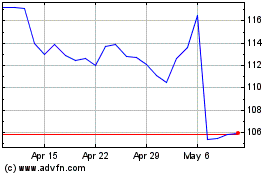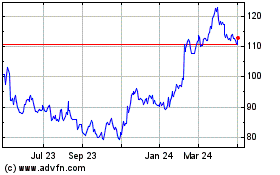Departed Disney Executive Linked to Firm That Used Brand Without Approval
March 30 2017 - 8:49AM
Dow Jones News
By Wayne Ma
BEIJING--A Chinese executive who left Walt Disney Co. after the
launch of an internal inquiry has links to a Hong Kong company that
used Disney's brand for a project in China without approval,
documents show.
A Disney spokeswoman said Thursday that Meng Dekai, who was
director of international special projects at Disney in China, was
no longer an employee. The spokeswoman declined to comment on the
circumstances of Mr. Meng's departure or say when he had left. Mr.
Meng couldn't be reached for comment.
Mr. Meng's departure came after Disney launched an internal
investigation in response to a report last month by the Chinese
news website The Paper. The Paper reported that Hong
Kong-registered DeeMagic International Culture Ltd., which is
linked to Mr. Meng, was attached to a park project that was branded
as a Disney facility despite not having the company's permission.
The Wall Street Journal couldn't find contact information for
DeeMagic.
"We are continuing to investigate the situation thoroughly and
are taking appropriate action as we continue this process," the
Disney spokeswoman said.
Like many Western brands, Disney has over the years battled its
fair share of counterfeit goods and even fake Disney stores in
China. In 2015, Chinese authorities launched a year-long special
campaign to protect Disney's trademarks ahead of the opening of its
Shanghai theme park, which is majority owned by a government-backed
company.
The Disney spokeswoman said the Burbank, Calif.-based company
had signed a preliminary agreement in November 2015 with Henan
province to "enhance the growth of the retail sector." The
spokeswoman said as part of the agreement, DeeMagic was given a
"limited consumer-product license agreement."
Disney policy "prohibits employees from entering into business
arrangements without prior approval. We were not advised of any
relationship between an employee and DeeMagic," the spokeswoman
said.
Mr. Meng is linked to more than 20 companies in China and Hong
Kong that share the first part of the name "Disney" in Chinese,
according to corporate-records searches. One of these companies is
DeeMagic, which also signed a separate agreement with the central
Chinese city of Zhengzhou, the capital of Henan province, for a
Disney-branded project.
Mr. Meng is linked to DeeMagic through Lin Yu, a director at
DeeMagic who is also an employee at two companies in China where
Mr. Meng is listed as executive director, including the similar
sounding DeeMagic International Culture Development Ltd., Chinese
corporate records show. Mr. Lin couldn't be reached for
comment.
The Paper, citing a local media report that has since been taken
offline, said in February that the Zhengzhou project would include
a Disney-branded administration and operations center, a shopping
street, postproduction film and animation facilities and an
animation-themed family resort. The Disney spokeswoman said
Thursday it wasn't involved in this project.
The website of a county in Henan province posted a statement in
November 2015 saying that at the same ceremony where Disney signed
its Henan agreement, an industrial-cooperation agreement also had
been signed between Zhengzhou and Mr. Meng, who was a
"representative of DeeMagic." That statement, which didn't
elaborate on either agreement, was removed from the website after
the appearance of The Paper's article.
The Disney spokeswoman said that beyond the limited-licensing
agreement, neither DeeMagic nor any of its affiliates were ever
authorized by Disney to promote any project or sign any agreement
in its name.
"DeeMagic has been told to immediately cease any such
unauthorized activities," the spokeswoman said.
Disney's push into China has largely been through merchandising
and theme parks rather than through media distribution, which is
tightly controlled by the central government.
In recent years, though, the Magic Kingdom has enjoyed greater
success at the Chinese box office, grossing almost $1 billion in
the country last year, more than the other big five Hollywood
studios in China combined. Last year, Disney, which already has a
theme park in Hong Kong serving mostly Chinese tourists, opened its
first mainland park in Shanghai at the cost of $5.5 billion. The
company is behind dozens of Disney English schools that teach
language skills to children but also serve as a marketing tool.
Mr. Meng's departure from Disney was reported Wednesday by the
New York Times.
Write to Wayne Ma at wayne.ma@wsj.com
(END) Dow Jones Newswires
March 30, 2017 08:34 ET (12:34 GMT)
Copyright (c) 2017 Dow Jones & Company, Inc.
Walt Disney (NYSE:DIS)
Historical Stock Chart
From Mar 2024 to Apr 2024

Walt Disney (NYSE:DIS)
Historical Stock Chart
From Apr 2023 to Apr 2024
